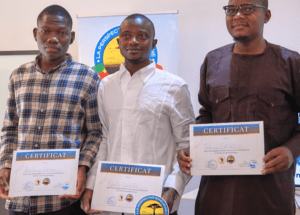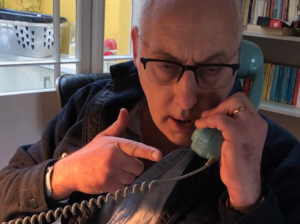- Opposites attract - 26th February 2026
- Upset coffee - 25th February 2026
- Not acting the part - 24th February 2026

After 41 years in journalism (when he was trained to use simple language, avoiding jargon), our Editor, Welshman Phil Parry, now looks on with horror as authoritarian states fund radio and television stations as well as newspapers all over the world, to pump out their ‘anti-colonial’ messages.
Several are being run down, just as others are being ramped up.
Cuts in Voice of America (VoA) and the BBC World Service (BBC WS) are coming at precisely the time as countries like Russia, China, and Turkey are INCREASING funding for media outlets to spread their anti-democratic views around the globe.

In March President Donald Trump pulled funding for VoA and its sister networks, while Tim Davie, the Director-General (DG) of the BBC, said on May 14: “The future of our cohesive, democratic society feels, for the first time in my life at risk”, calling for increased funding to double the reach of the BBC WS.
But it seems President’s Trump’s move could be ill-timed, while Mr Davie’s words are falling on deaf ears, and the future appears to be one they are opposed to.

Last year a new press agency called African Initiative (AI) was set up in the capital of Mali, Bamako.
Nothing wrong with that you might think.
Except that AI is run by Russian intelligence.
Many Western countries are winding down their efforts in broadcasting to the world, even as other problematic ones are coming more to the fore.
 Eighteen months ago RT (Russia Today), Russia’s state-controlled news network, launched advertising campaigns in countries including Mexico, India, Serbia and Tunisia.
Eighteen months ago RT (Russia Today), Russia’s state-controlled news network, launched advertising campaigns in countries including Mexico, India, Serbia and Tunisia.
Last year it opened the RT Academy, which trains ‘journalists’ in Africa, South-East Asia and China.

 Sputnik, another state-run Russian news organisation, recently launched an Africa service.
Sputnik, another state-run Russian news organisation, recently launched an Africa service.
RT and Sputnik have been expanding in Latin America, where they share producers, camera crews and office space with Venezuela’s Telesur and Iran’s HispanTV.
Turkey’s state-run TRT news network launched an Africa service in 2023, opening a Somali-language branch in March and it has been hiring former BBC staff.
 Besides promoting Turkey’s actions in Africa generally, where it invests, for example, in arms exporters, TRT condemns former colonial powers.
Besides promoting Turkey’s actions in Africa generally, where it invests, for example, in arms exporters, TRT condemns former colonial powers.
But the biggest investment in foreign journalistic operations seems to have been made by China.
Xinhua, a state-run news agency, has increased its Africa bureaus from a “handful” two decades ago to 37 last year.

Chinese ‘news’ is especially strong on social media.
While American congresspeople fret about TikTok, China appears to be relying in fact on Facebook (FB) to spread its message internationally.
The most-followed news organisation on FB is not CNN or the New York Times (NYT), but CGTN, China’s state-run TV network (the radio version of which I foolishly appeared on many years ago).

Despite the fact that FB is banned in China itself, the five most-followed news organisations on FB are all Chinese, disseminating ‘news’ in English.
Some of this information is true (although presented misleadingly), however some is simply fake.
Chinese outlets are trying out multiple adverts before (as with their new worldwide media offices) pouring millions into the most effective ones.
Some ads are innocuous clickbait, showing off Chinese tourist hotspots etc. but others are politically charged: last year Xinhua paid FB to boost a story implying that Filipino fishermen in disputed waters were spies, with the hashtag #fishyfishermen.


As well as distributing news under their own brand, countries are doing deals to insert their stories into local titles too, and they are often grateful for the cheap content the Chinese supply.
Xinhua has an agreement with Kenya’s Nation Media Group (NMG), giving it access to the firm’s eight radio and TV stations, 28 million social-media followers and 90,000 daily-newspaper readers in four African countries.
Meanwhile RT has contracts with more than 30 African TV stations to broadcast its content.
Russia is particularly keen on this kind of ‘narrative laundering’, in the words of Victor Ilie of Snoop, a news site in Romania.

As audiences grow suspicious of outlets like Sputnik, Russia is increasingly co-opting influencers.
Romania’s presidential election was cancelled in December after its security agencies claimed to have uncovered a Russia-led influence operation on TikTok; in a re-run this month another candidate came first.
This is all very worrying for a journalist who has spent many years in the media.
Naively I have always thought a fact is a fact is a fact, with journalists like me left alone to find them out – dubious ones should not be used as propaganda tools by authoritarian regimes, and questionable media outlets should NOT be funded…

The memories of Phil’s astonishing, decades long award-winning career in journalism (when interference from the state was a complete no-no) as he was gripped by the rare neurological disabling condition Hereditary Spastic Paraplegia (HSP), have been released in the book ‘A Good Story’. Order it now.









